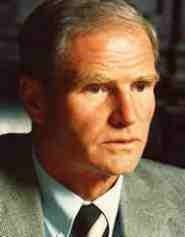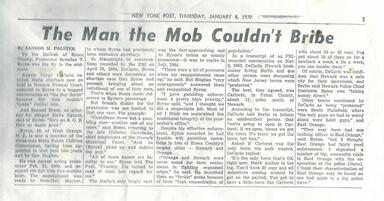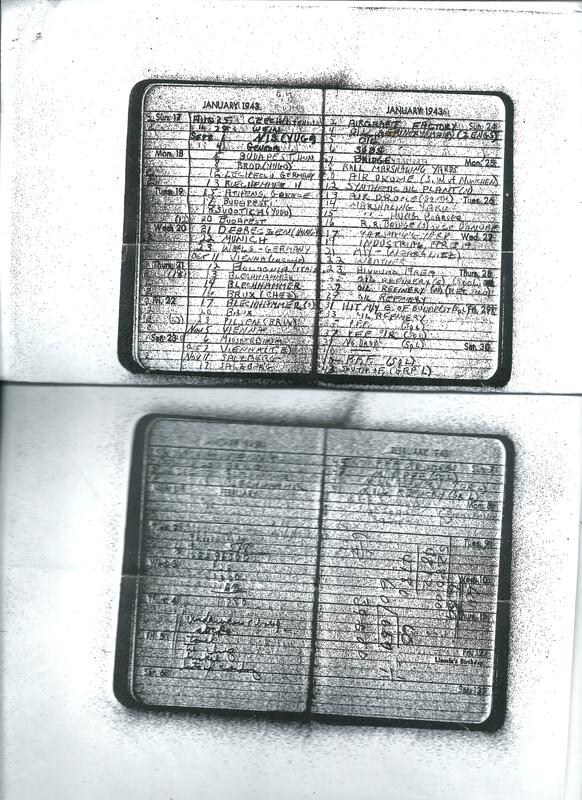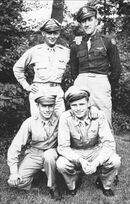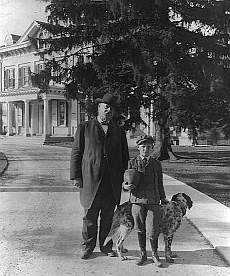- New Jersey Biographies A-D
- Louis Bamberger - Clara Barton - Count Basie - Joseph Bloomfield - Seth Boyden
- William Brennan - Aaron Burr - Brendan Byrne - Grover Cleveland - Stephen Crane - Jonathan Dayton
- John Dorrance - Mabel Douglass - Alfred Driscoll - John Dryden
-
|
* Home
* History * Population * Government * Politics * Lobbyists * Taxes * State Symbols * Biographies * Economy * Employers * Real Estate * Education * Recreation * Restaurants * Hotels * Health * Environment * Stadiums/Teams * Theaters * Historic Villages * Historic homes * Battlefields/Military * Lighthouses * Art Museums * History Museums * Wildlife * Climate * Zoos/Aquariums * Beaches * National Parks * State Parks * Amusement Parks * Waterparks * Swimming holes * Arboretums More... * Gallery of images and videos * Fast Facts on key topics * Timeline of dates and events * Anthology of quotes, comments and jokes * Links to other resources |
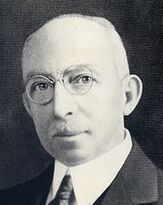 Image: Wikimedia Commons Image: Wikimedia Commons
Louis Bamberger
1855-1944 Retailer and philanthropist. After buying at auction a failed dry goods store, founded L. Bamberger & Co. department store in Newark in 1892, became one of most successful stores in US. With sister Caroline Bamberger Fuld, gave $5 million in 1930 to establish Institute for Advanced Study in Princeton as refuge for Jewish scientists fleeing Nazis, including Albert Einstein who emigrated in 1933. Sold store in 1928 to R.H. Macy & Co., Macy's retained name on New Jersey stores until 1986. Also owned radio station WOR since its founding in his store in 1922, funded numerous programs devoted to cultural interests and donated radios for use in schools. Other causes included funding for Newark’s YMHA, Beth Israel Hospital, Newark Museum, and New Jersey Historical Society. * Institute for Advanced Study 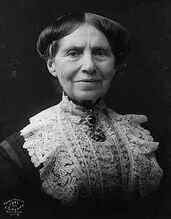 Image circa 1904: Library of Congress Image circa 1904: Library of Congress
Clara Barton
(1821-1912) Born in Massachusetts, as child nursed brother back to health after his fall from barn roof. Began teaching in 1838 for 12 years in schools in Canada and Georgia, in 1850 moved to New York to further education in writing and languages at Clinton Liberal Institute. Following studies, opened a free school in Bordentown, first free public school to be opened in New Jersey, attendance grew to over 600 in one year, but school board hired man as principal of school. Relocated to Washington D.C. in 1855, worked as clerk in US Patent Office, first woman to obtain substantial federal post at salary equal to a male's, but position later eliminated. During Civil War, organized gathering of medical supplies, food and clothing through Ladies' Aid Societies, after initial rejections obtained permission from military to work as nurse on front lines. 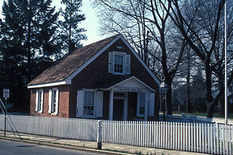 Reconstruction of school in Bordentown founded by Clara Barton. Image: National Park Service Reconstruction of school in Bordentown founded by Clara Barton. Image: National Park Service
Nursed soldiers at battles including Antietam, Second Bull Run and Fredericksburg, became known as "Angel of the Battlefield." In 1864 appointed by Union General Benjamin Butler as "lady in charge" of hospitals at the front. After war, headed Office of Missing Soldiers in Washington, succeeded in identifying locations of over 22,000 killed or missing soldiers. On tour of Europe, learned of activities of International Red Cross based in Switzerland, returned to found in 1881 and become first president of American Red Cross until resigning in 1904. In later years, supported movements for women's suffrage and equal rights for African Americans.
* The Story of My Childhood by Clara Barton (1907) * Woman of Valor: Clara Barton and the Civil War by Stephen B. Oates (1995) * Clara Barton National Historic Site, Maryland, National Park Service 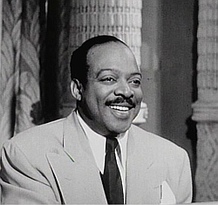 Image: Wikimedia Image: Wikimedia
William “Count” Basie
1904-1984 Born in Red Bank, famed jazz pianist, organist, composer and bandleader of Count Basie Orchestra. As youth in Red Bank operated lights for vaudeville and improvised piano accompaniment for silent films at local movie theater, played jazz piano at parties, resorts and other venues. In 1924 went to Harlem, toured major jazz cities of Chicago, St. Louis and Kansas City. Performed for some fifty years with jazz legends including Lester Young, Joe Williams, Billie Holiday, and Tony Bennett. Recordings earned nine Grammy Awards, other honors included Kennedy Center Honors, Grammy Lifetime achievement award, Hollywood Walk of Fame, Down Beat Jazz Hall of Fame. * The World of Count Basie by Stanley Dance * The Basie Big Band (audio CD remastered) 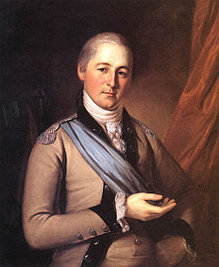 Painting by Charles Willson Peale Image: Wikimedia Commons Painting by Charles Willson Peale Image: Wikimedia Commons
Joseph Bloomfield
1753-1823 Fourth New Jersey governor. Born in Woodbridge, father Moses Bloomfield a prominent surgeon and abolitionist who served in both colonial assembly and state legislature following independence. Attended Presbyterian church school in Deerfield, studied law and admitted as attorney in in 1775 and began law practice. Entered Continental Army as captain in February 1776, promoted to major in November and appointed judge advocate of northern army. Wounded at Battle of Brandywine in September 1777, resigned from Army in October 1778 after election as clerk of state General Assembly. Practiced law in town of Burlington, served as chief justice of admiralty court from 1779 to 1783 until appointment as New Jersey Attorney General, post he held until 1792. In 1794, as commander of New Jersey militia, led federal and New Jersey state troops at direction of President Washington to put down Whiskey Rebellion, uprising of Appalachian settlers near Pittsburgh protesting federal excise tax on liquor and distilled drinks. Mayor of Burlington 1795 to 1800. Originally a Federalist who served as an elector for Washington in 1792 election, but elected governor as Jeffersonian Democratic-Republican and served separate one year terms (with exception of 1802) from 1801 to 1812. As governor, signed legislation gradually abolishing slavery in state. At start of War of 1812, commissioned as brigadier general, served along Canadian border until June 1815. Elected to US House of Representatives from statewide at-large district, served 1817-1821 but defeated in 1820 election. Died in Burlington, buried there in cemetery of Saint Mary's Episcopal Church. In 1796, what had been known as Old First Church renamed as Presbyterian Society of Bloomfield in his honor; upon its separation from Newark and incorporation as separate municipality in 1812, Township of Bloomfield took its name from church. Bloomfield College, four-year private college, founded 1868 as German Theological School by Presbytery of Newark, relocated to Bloomfield in 1872. * General Joseph Bloomfield--A Revolutionary Life by Donald Johnstone Peck (2014) 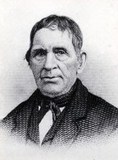 Image: Wikimedia Commons Image: Wikimedia Commons
Seth Boyden
1788 - 1870 Inventor whose work significantly advanced Industrial Revolution. Achievements included perfecting process for making patent leather, creating malleable iron, inventing nail-making machine, building a steamboat, developing a cut-off switch for steam engines and improving method for producing zinc from ore. Born in Massachusetts, worked first at blacksmith's forge, later became engineer, and employed in construction of railroad from Boston to Nashua. After moving to Newark in 1815 produced patent leather in 1819 by applying layers of linseed oil-based coats, led to making glossy leather boots, shoes, belts and other products which quickly sold well, formed basis for Newark growth as a leading leather producer. Developed two-step heat treatment method for iron ores to make them soft and pliable, malleable cast iron process aided gunsmiths, locksmiths, blacksmiths and coachmakers. Also built steam engines for locomotives and fire engines, improved telegraph invented by Samuel Morse and credited with perfecting daguerreotype camera. Did not seek patent for patent leather or other inventions with sole exception of hat making machine soon before his death. Failure to seek profit from inventions led to financial difficulties late in life, industrialists collectively contributed to purchase home for him in what is now Maplewood. Statue of Boyden in Washington Square Park in Newark; name also on elementary school in Maplewood; and complex of public housing projects in Newark. * Seth Boyden, American Society of Mechanical Engineers * Seth Boyden Statue, newarkhistory.com 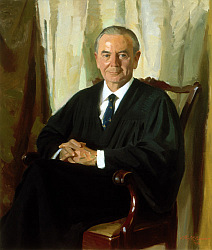 Image: US Supreme Court Image: US Supreme Court
William J. Brennan
1908-1997 Son of Irish Immigrants, attended public school in Newark graduating from Barringer High School. Upon graduation from Harvard Law School, began private practice at firm of Pitney Hardin in Newark. After military service during World War II, appointed first by Governor Alfred Driscoll to Superior Court and in 1952 to New Jersey Supreme Court. Although a Democrat, appointed in 1956 to US Supreme Court by Republican President Dwight Eisenhower, wrote over 1,300 opinions until retirement in 1990. Known as liberal defender of individual rights and expansion of free speech. Leading opinions include Baker v. Carr (1962) holding that issues on legislative districting could be decided by courts; New York Times Co. v. Sullivan (1964) mandating proof of malice by publishers in defamation cases brought by public officials; Goldberg v. Kelly (1970) requiring hearings before revocation of welfare benefits. Law clerks included Daniel J. O'Hern, served 1981-2000 on New Jersey Supreme Court after appointment by Governor Byrne. * Justice Brennan: Liberal Champion by Seth Stern and Stephen Wermiel (2010) * William J. Brennan, Jr., Oyez Project, Chicago-Kent School of Law 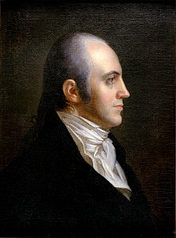 Portrait in 1802. Image: Wikimedia Commons/NY Historical Society Portrait in 1802. Image: Wikimedia Commons/NY Historical Society
Aaron Burr
1756-1836 Born in Newark, father also named Aaron Burr a Presbyterian minister and president of College of New Jersey (later renamed Princeton University in 1896), mother prominent diarist Esther Edwards Burr a daughter of New England theologian Jonathan Edwards, but both parents died before son reached three. Raised in uncle's family, at age 13 enrolled at College of New Jersey, graduated summa cum laude in only three years. After graduation, attended Litchfield Law School in Connecticut, but left when Revolutionary War broke out, joined General Benedict Arnold's forces in invasion of Quebec. By spring 1776, promoted to rank of major, appointed to serve as aide to George Washington, later transferred to staff of General Israel Putnam, resigned his commission in 1779. Following resumption of legal studies, admitted to New York bar in 1782, opened successful private practice in Albany, subsequently moved to New York City, spent next six years practicing law. Served in New York State Assembly 1784-1785. In 1789, appointed attorney general of New York. Elected to US Senate in 1791, also served again in state Assembly 1798-1799. During state legislative service, attempted unsuccessfully to pass laws granting vote for women and abolishing slavery. Unsuccessful candidate in 1800 for US president, but under constitution at time elected vice president under rival Thomas Jefferson. In last year of term as vice president in 1804, challenged political opponent Treasury Secretary Alexander Hamilton, who had worked to defeat Burr's election as president in 1800, to duel held July 11 at Weehawken in which Hamilton mortally wounded, dying following day. In 1807, after purchasing extensive land on western frontier, charged by President Jefferson with treason for alleged plan to invade Mexico with hired soldiers to liberate it from Spain and establish independent territory, but acquitted after trial presided over by Chief Justice John Marshall. Accusations and debts incurred in defense ended political career, relocated to Europe 1808, but returned in 1812 to rebuild law practice in New York. In 1833, at age 77, married wealthy widow 19 years younger, but she separated from him four months after wedding upon discovering Burr had diverted funds for failed land speculation investments, divorce decree entered September 14, 1836--day of Burr's death on Staten Island. Buried in Princeton cemetery near father. * American Emperor: Aaron Burr's Challenge to Jefferson's America by David O. Stewart (2012) * Fallen Founder: The Life of Aaron Burr by Nancy Isenberg (2007) * A Fatal Friendship: Alexander Hamilton and Aaron Burr by Arnold A. Rogow (1998) * Aaron Burr Association Upon return in 1945, enrolled at Princeton University, then received law degree from Harvard Law School. Private law practice as trial lawyer, including with firm of later NJ Supreme Court Chief Justice Joseph Weintraub. Appointed as an assistant counsel on staff of Governor Robert Meyner, also served as executive secretary, subsequently named by Meyner as Essex County Prosecutor, later appointed by Governor Hughes as president, Public Utilities Commission, and named judge of Superior Court by Republican Governor Cahill. Resigned as judge 1973 to become Democratic gubernatorial candidate, Democratic leaders urged him to run during period of Watergate scandal impacting Nixon administration and corruption allegations implicating associates of Governor Cahill, with Byrne labeled as "the man who couldn't be bought" as result of transcripts of FBI wiretaps of organized crime figures in which they stated futility of attempting to bribe then Essex Prosecutor Byrne After winning nomination, landslide victory over Republican Congressman Charles Sandman. After stating during campaign he did not see need for an income tax in "foreseeable future," changed position during first year in office to advocate tax, led to sharp fall in popularity, with his perceived political weakness resulting in several challengers to his nomination for re-election in 1977, but split vote among opponents allowed him to win Democratic primary with just over 30% of total votes cast. Despite commencing general election campaign well behind Republican nominee Raymond Bateman, recovered to win 55.7% of vote, easily defeating Bateman after Republicans were unable to develop credible alternative to Byrne income tax program. After leaving office, returned to private law practice, also taught part-time at Princeton and Rutgers. Brendan T. Byrne State Forest named in his honor during McGreevey administration recognizing his success in creating Pinelands protection program. Seven children with wife Jean Byrne, eldest son Brendan Jr. ("Tom") served as chair of Democratic State Committee. After divorce from Jean Byrne, married former Ruthi Zinn. Died at age 93 in January 2018.
* .Brendan Byrne, former N.J. Governor and elder statesman, dies at 93, 1/4/2018, NJ.com * New Jersey Governor Brendan Byrne: The Man who Couldn't be Bought by Donald Linky (2014)
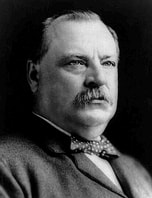
Grover Cleveland 1837-1908 Born Stephen Grover Cleveland in Caldwell, one of nine children of Presbyterian minister. Family moved to Fayetteville, New York when father took over a new congregation. Quit school to work after father's death in 1856, later moved to Buffalo to live with uncle where he studied law and was admitted as attorney. Elected Erie County sheriff in 1870, Mayor of Buffalo in 1881, developed anti-corruption reputation. Elected governor in 1882, benefited from splits among Democratic opponents for nomination and among Republicans in November election. Won 1884 presidential election on anti-corruption platform aided by support from reform Republicans known as "Mugwumps," first Democrat elected since end of Civil War. 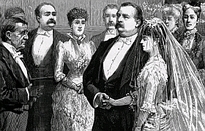 Drawing of President Cleveland's and Frances Folsom's wedding in White House which was published in Harper's Weekly on June 12, 1886. Image: Wikimedia Commons Drawing of President Cleveland's and Frances Folsom's wedding in White House which was published in Harper's Weekly on June 12, 1886. Image: Wikimedia Commons
On June 2, 1886, at age 49 married 21-year- old Frances Folsom, daughter of close Buffalo friend whose estate Cleveland had administered, only President to be wed in White House, subsequently had five children. As president, opposed special corporate favors and protective tariffs, but also used federal troops to end labor strikes. Defeated for re-election in 1888 by Benjamin Harrison despite winning popular vote, resumed law practice. Ran again in 1892 election, defeated President Harrison in both popular and electoral votes, became only President to leave White House and return for second term four years later. After end of term, purchased home in Princeton, became Princeton University trustee and lecturer, named home "Westland" to recognize aid in its purchase by Andrew West, a close friend and dean of Princeton graduate school who was an antagonist of University President Woodrow Wilson. Died at home in Princeton at age 71, buried in Princeton Cemetery.
* Grover Cleveland, Miller Center, University of Virginia * Grover Cleveland, National Museum of American History * Grover Cleveland Birthplace in Caldwell, Division of Parks & Forestry. New Jersey Department of Environmental Protection 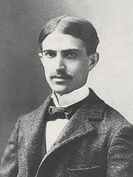 Image: Wikimedia Commons Image: Wikimedia Commons
Stephen Crane
1871-1900 Author, poet and journalist. Born in Newark, 14th and last child of minister of Methodist Episcopal Church and social activist daughter of a clergyman, previous four children each had died before first birthday. Family descended from a founder of New Haven Colony settled in 1639, others later among first to found Elizabethtown in New Jersey. Great-great-grandfather Stephen Crane (1709–1780) a New Jersey delegate to First Continental Congress. Family moved in 1876 to Port Jervis, New York, where father became pastor of Drew Methodist Church. After father's death in 1880, mother moved with youngest children, including Stephen at age 12, to Asbury Park, where her adult son Jonathan had established a news bureau and which was adjacent to Methodist community of Ocean Grove. Mother soon became president of local chapter of Women's Christian Temperance Union. Stephen attended public school in Asbury Park, then Pennington School near Trenton prior to spending single semesters at Lafayette College and Syracuse University. During summers since a teenager, wrote news stories relating to Asbury Park and nearby towns for brother’s news service, left Asbury Park after summer of 1892. Left Syracuse University in 1891 to work as reporter and writer, won acclaim for second novel in 1895, The Red Badge of Courage, highly realistic account of Civil War which he wrote without having any battle experience. Subsequently worked as foreign correspondent in Cuba, Greece and England accompanied by his lover Cora Taylor, wife of a British army officer, who became first woman recognized as war correspondent for coverage of war in 1897 between Greece and Turkey. While living with Cora in England, traveled to German health resort, died there of tuberculosis at age 28. Body returned by Cora for burial in family plot at cemetery in Hillside. * Stephen Crane Papers, Columbia University * Stephen Crane Photograph Collection, Syracuse University * Stephen Crane Society * "Stephen Crane," Poetry Society * Stephen Crane House, Asbury Park 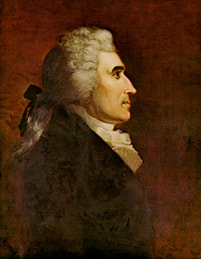 Image: US House of Representatives Image: US House of Representatives
Jonathan Dayton
1760-1824 Youngest person at age 26 to sign US Constitution and fourth Speaker of US House of Representatives. Born in Elizabethtown (now Elizabeth). Father Elias Dayton a New Jersey militia officer in French and Indian War, subsequently a commander in Pontiac's War near Detroit, returned to Elizabethtown to conduct business as merchant and owner of general store, became active in colonial tax protest movement to boycott goods imported from Britain, later named colonel and general in Continental Army and elected to Continental Congress and as mayor of Elizabethtown. Jonathan graduated from local academy in Elizabethtown, a classmate of Alexander Hamilton, then attended College of New Jersey (now Princeton) but left in 1775 at age 15 to fight in revolution (later awarded honorary degree in 1776), served as an ensign under his father Elias in Third New Jersey Regiment. Remained in Continental Army throughout War, served under Washington in battles of Brandywine Creek and Germantown and during winter at Valley Forge, attained rank of captain in 1780 at age 19, taken prisoner by loyalists at Elizabethtown until released in prisoner exchange, also with Washington in Virginia where at Yorktown he led nighttime bayonet attack under command of former classmate Alexander Hamilton prior to British surrender. After discharge from Army in 1783, studied law and invested successfully in real estate, owned claims to nearly 250,000 acres in Ohio (which later led to Dayton, Ohio being named after him). Elected to New Jersey General Assembly, served 1786-1787, 1790, and speaker in 1790. Delegate to Constitutional Convention in Philadelphia and signer of Constitution in 1787. Delegate to Continental Congress 1787-1788 and as member of House of Representatives under new Constitution 1791-1799. In 1799, declined offer of commission as Major General in US Army to remain in Congress. Elected Speaker of House of Representatives for Fourth and Fifth Congresses 1795-1799. Gave up House seat in order to run successfully for US Senate, served single term 1799-1805. Arrested in 1807 after loaning money to former College of New Jersey classmate Aaron Burr, who was charged by President Thomas Jefferson with treason (but later acquitted) over alleged plan to assemble western lands and establish independent territory, but subsequently released and never brought to trial. Charges damaged reputation, but later recovered to win election to single term in state Assembly 1814-1815. Shortly before his death, entertained Marquis de Lafayette at home of Boxwood Hall in Elizabethtown, which he had purchased in 1795 from Elias Boudinot, former president of Continental Congress. Died in Elizabethtown, interred in vault under St. John’s Episcopal Church. * Jonathan Dayton, US House o f Representatives 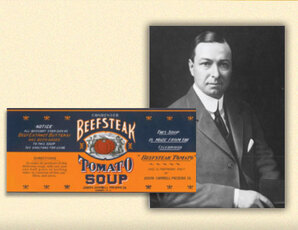 Image: Campbell Soup Company Image: Campbell Soup Company
John Dorrance
1873-1930 Chemist who worked for Joseph Campbell Preserve Company, later renamed Campbell Soup Company, where he invented condensed soup in 1897, served as company’s president for 16 years until death in 1930, bought out founding Campbell family, credited with building business into global leader. Born in Bristol, Pennsylvania, earned B.S. from Massachusetts Institute of Technology, and Ph.D. from University of Göttingen in Germany. A nephew of Arthur Dorrance, general manager of Joseph Campbell Preserve Company, at age 24 hired in 1897 to work there at $7.50 per week. Died on September 21, 1930, of heart disease at home in Cinnaminson Township, both New Jersey and Pennsylvania claimed him as resident at death for tax purposes, US Supreme Court declined to resolve dispute. Estate in Radnor Township, Pennsylvania, now campus of Cabrini College. Brother Arthur Dorrance succeeded as Campbell's president until death in 1946, son John T. Dorrance, Jr. served as board chair from 1962 to 1984. * History of the Campbell Soup Company, Camden County 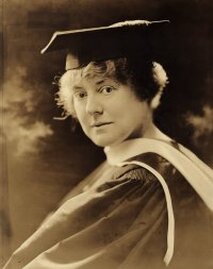 First College commencement in 1922. Image: Rutgers University Libraries First College commencement in 1922. Image: Rutgers University Libraries
Mabel Smith Douglass
1874-1933 Appointed as Dean of New Jersey College for Women upon its opening in 1918 with 54 students and 16 faculty members offering courses in liberal arts and home economics. Established as separate women's college at Rutgers, later critics argued it was retreat from goal of co-education with classes shared with men. Attended public school in Jersey City, in 1899 graduated from Barnard College in New York City. In 1903, married William Shipman Douglass, owner of a shipping business, had two children. After husband died in 1917, managed husband's business for year before selling it, later named Chairwoman of New Jersey State Federation of Women's Clubs. Oversaw College's survival and later growth by effective lobbying with Rutgers administration and local and state officials and legislators, for first year as dean slept in her office at College Hall and managed budget, curriculum, faculty, building repairs, and floor plans. During time of limited funds, constructed gymnasium from World War I surplus packing materials. In September 1932 retired due to ill health, a year later she disappeared at New York camp she owned while rowing on Lake Placid, boat found capsized but body not found until 30 years later in 1963, when remains found by scuba divers. In 1955, New Jersey College for Women renamed as Douglass College. In 2007, Rutgers implemented controversial reorganization which merged College with four others on campus into a School of Arts and Sciences with unified admissions standards and academic requirements, renamed Douglass as Douglass Residential College with all-female campus and female-oriented programs. * Mabel Smith Douglass 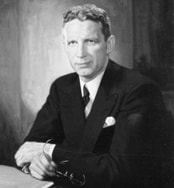 Image: New Jersey State Archives, Department of State Image: New Jersey State Archives, Department of State
Alfred E. Driscoll
1902-1975 Governor for two terms from 1947 to 1954, elected as Camden County Republican over Democrat Lewis Hansen of Hudson County, first to serve under new constitution approved in 1947 of which he was a leader in drafting and approval. Also proposed and built New Jersey Turnpike and Garden State Parkway, used tolls for financing after prior tax-funded concepts had failed in legislature. After leaving office, appointed president of what became Warner-Lambert pharmaceutical company, also as chair of Turnpike Authority where he advocated for Turnpike extension, to be named "Alfred E. Driscoll Expressway," from New Brunswick to Toms River, project abandoned after opposition from Governor Byrne on environmental, land-use preservation grounds. Appointed Democrat William J. Brennan as judge of Superior Court and justice of state Supreme Court, where he served until appointment to US Supreme Court by President Eisenhower in 1956. Delegate to Republican National Convention in 1948 and 1952, one of those supported for 1952 vice presidential nomination won by Richard Nixon. Born in Pittsburgh, graduate of Williams College and Harvard Law School. While in private practice in Camden, elected to Haddonfield school board, later to Haddonfield governing body. Elected 1937 to state Senate, served until 1941 when appointed to head state Alcoholic Beverage Control Commission. Died at age 72 at home in Haddonfield, widow requested that then Governor Byrne not attend funeral due to opposition to Turnpike extension. * Alfred E. Driscoll, speeches, budgets and reports, New Jersey State Library 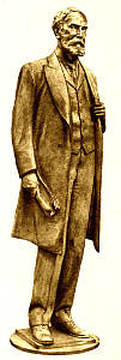 Statue sculpted and erected in 1915 with support from donations of Prudential employees at company headquarters in Newark. Image: Project Gutenberg Statue sculpted and erected in 1915 with support from donations of Prudential employees at company headquarters in Newark. Image: Project Gutenberg
John F. Dryden 1839-1911
Founder in 1875 of Widows and Orphans Friendly Society, which later became Prudential Insurance Company of America and Prudential Financial, also US Senator from New Jersey 1902-1907. Born in Maine, raised in Massachusetts, graduate of Yale. Ancestors include John Dryden (1631-1700), greatest English poet of seventeenth century. After organizing Widows and Orphans Friendly Society in Newark, became its first secretary and in 1881 its president, served as president until 1911. First company in US to market life insurance to working class covering funeral and burial expenses for low-income families, with some weekly premiums as low as three cents. In 1885 Dryden personally purchased company's one millionth policy, in 1887 company renamed Prudential Insurance Company of America. Also one of founders of Fidelity Trust Company and Public Service Corporation, a director of United States Steel Corporation and other enterprises in New Jersey, New York, and Pennsylvania. Elected as Republican by legislature to fill US Senate vacancy created by death of William J. Sewell, withdrew as candidate for re-election due to deadlock in state legislature, which at time elected senators. Died in Newark from pneumonia following surgery two weeks earlier to remove gall stones. Estate valued at $50 million ($1.25 billion in 2020 dollars), buried in Mount Pleasant Cemetery in Newark. Resided in Bernardsville, at time of death building large mansion at High Point on Delaware River, daughter and son-in-law later donated property of 10,500 acres which became High Point State Park. Dryden grandson John Dryden Kuser later a state senator and first husband of Brooke Astor. * Prudential History |
